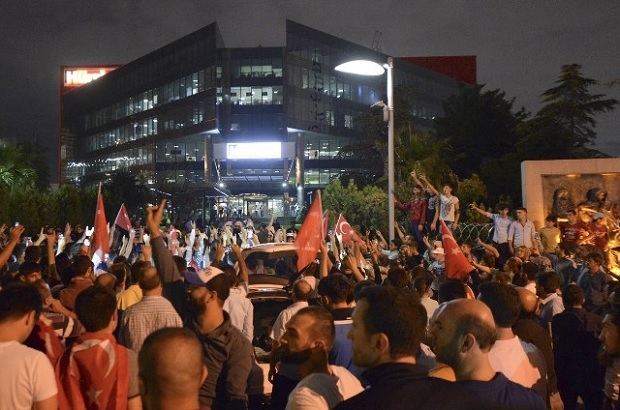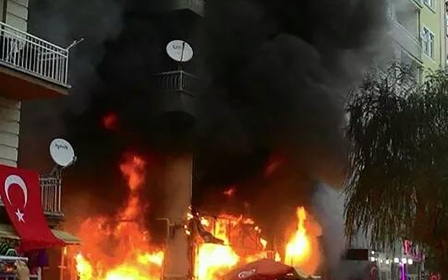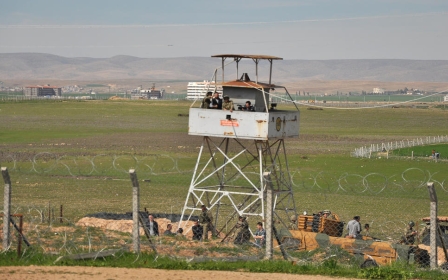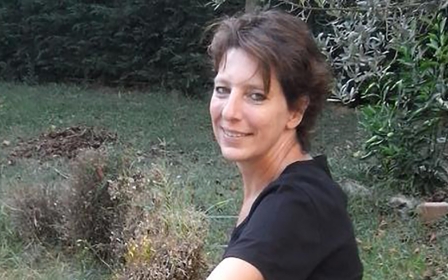ANALYSIS: Is press freedom in Turkey under attack again?

ISTANBUL, Turkey - The last fortnight in Turkey has witnessed the detention and deportation of foreign journalists, police raids on a publically traded corporation with media interests, and the targeting of the offices of a Turkish newspaper by an incensed crowd two times in less than 48 hours, leading to fears about the state of press freedoms in the country.
Critics say it is yet another move to silence critical and independent media, which refuse to toe the government line. Government supporters, on the other hand, dismiss any suggestion of a media crackdown and say that what is being countered are multiple plots that target the Turkish president in particular.
The latest incident took place on the night of 7 September in Istanbul when a group of around 150 people attacked the premises of the Hurriyet newspaper. The group, comprised of supporters of the Justice and Development Party (AKP) and including a parliamentarian from that party, gathered in front of the newspaper’s offices and accused the paper of misquoting Turkish President Recep Tayyip Erdogan’s remarks during a live televised broadcast earlier in the evening.
The newspaper’s website ran a headline that quoted Erdogan as saying that if a political party had managed to elect 400 parliamentarians or a majority big enough to amend the constitution, the situation would be different. The situation, as portrayed by Hurriyet, was an apparent reference to an incident a few hours previously where more than a dozen Turkish soldiers were killed in an attack in southeastern Turkey attributed to the Kurdistan Workers’ Party (PKK).
The newspaper’s editor-in-chief, Sedat Ergin, has said the paper stands by the story but is debating if the headline was used in the proper context. He also said such a response is unacceptable even if a mistake was made.
Turkey’s Interior Minister Selami Altinok sent a note of commiseration to the newspaper and said nobody can take the law into their own hands, and that they would not compromise on the principles of a state of law.
Yusuf Kanli, the coordinator of the Press for Freedom project of the Association of Journalists, believes this attack had an indirect official blessing and draws a parallel with the state-sponsored oppression of Turkish media in the 1950s.
“The whole incident was organised and led by a parliamentarian from the ruling party ranks. The police took their time to intercede, and when they eventually did, the group dispersed without any altercation with the police,” Kanli told Middle East Eye.
The Dogan Group, to which Hurriyet also belongs, has been targeted for months now by writers at pro-government media outlets and has been accused of siding with "terrorists".
Erdogan, in another segment of the same televised appearance, also lashed out at the Dogan Group and some of its writers for writing untruths and slanderous articles and then claiming their actions were not intentional. He said they would answer for their actions in courts of law.
According to Ersoy Dede, a columnist at the staunchly pro-government Yeni Akit newspaper, the gathering was spontaneous and the protestors were well within their rights to protest the targeting of their country’s leader. He said the arrival of an AKP parliamentarian, who also heads the party’s youth branch, on the scene was to appease the protesters and prevent any escalation of actions that amount to vandalism.
“For years now the Dogan Group and others have been manipulating news stories to make it look like Erdogan is a merciless murderer who is willing to sacrifice the lives of his people and those of others for his own gains. Erdogan’s supporters are fed up with this unwarranted character assassination and decided to openly protest against it,” Dede told MEE.
Dede also says any comments made by the parliamentarian at the scene, which could be considered as inflammatory, were intended to mollify the enraged crowd and get them to disperse peacefully. He said the AKP does not condone the pelting of rocks and trying to enter the premises by force.
Targeting media or 'terror financing'?
Last week, the corporate offices of the Koza Ipek Holding group were raided by teams from the financial crimes unit accompanied by police. The Koza Ipek group, which also owns a television station and newspapers, is said to be closely linked to Fethullah Gulen.
Gulen - a preacher who went from being an ardent ally of Erdogan and the AKP to becoming the party's arch foe, and who lives in self-imposed exile in the United States - is accused by the government of heading an organisation that sought to infiltrate all of Turkey’s state institutions and topple the government from the inside.
Gulen’s supporters claim their movement has only sought to expose the rampant corruption within government and AKP ranks.
The state has designated it a terrorist organisation and even given it a name: Fethullahist Terrorist Organisation.
The raids on the Koza Ipek group were conducted on the suspicion that the group is engaged in money laundering and financially abetting a terrorist organisation. None of the company’s media businesses were targeted in the raids.
Akin Ipek, the company’s director, left the country for the UK two days prior to the raid and has since pleaded complete innocence. An arrest warrant has been issued for him. Seven of the company’s executives were released after questioning.
Gulen-affiliated media and officials have also been accused of fabricating claims and documentation that led to the incarceration of many critical journalists and secular-leaning figures in the past. Supporters of the movement have never responded to these accusations.
Kanli says he has neither forgotten nor forgiven the Gulen community’s role in the imprisoning of scores of journalists and others, but emphasised that it shouldn’t mean condoning actions where groups or people are targeted on the basis of circumstantial evidence.
“It is a matter of principle. Just like I was always opposed to the crackdown on secular figures in the past on flimsy and concocted charges; the same applies in this case,” said Kanli.
He believes that these raids were originally intended to target Koza’s media enterprises as well.
“I have seen the five-page order by the prosecutor and it included raiding their media businesses as well. There was a change of plan following the strong reaction to the raids,” he said.
Dede disagrees and says that not even one Gulen-affiliated media outlet or staff member has been targeted for journalism-related offences. He says this has been the case ever since the illegal activities of the Gulen network came to light and the efforts to dismantle their structure began.
“People from this community have been prosecuted for illegal activities, and just because they were engaged in such activity under the guise of journalism doesn’t mean the media was targeted. This is despite plenty of internal calls from people within the government and ruling party to investigate their media mouthpieces,” said Dede.
“If the accounts of a corporation are being investigated, it is natural that the financial activities of that corporation’s media enterprises will also be scrutinised.”
Critics are concerned that these raids might herald a wider crackdown on opposition and independent media outlets as snap polls scheduled for 1 November draw closer.
A whistle blower who uses the Twitter handle Fuat Avni had tweeted around a month ago that a new media crackdown was being planned. Fuat Avni has developed a reputation for accurately predicting government raids and operations.
International journalists under scrutiny
Foreign journalists have also become targets of authorities. Three journalists representing Vice News were arrested in southeastern Turkey on 27 August. They were accused of working on behalf of a terrorist organisation. Two of the three, both British citizens, have since been released and deported. They have both returned to the UK. The third, an Iraqi passport holder, Mohammed Ismail Rasool, remains in custody.
In another incident, Dutch journalist Frederike Geerdink tweeted on 6 September that she had been taken into custody in the southeastern Turkish town of Yuksekova. Geerdink was previously arrested in January and charged with conducting propaganda for the PKK. She was acquitted by a court in April. [Anadolu Agency said in a news report that Geerdink was released on Tuesday.]
For Dede, journalistic ethics and norms are the same everywhere in the world, and intervention by the authorities is justified if the actions of journalists have an adverse impact on national security and laws are violated.
“While I am unaware of the minute details of these incidents and while I have the utmost respect for all journalists, I also believe that the authorities possess the right to investigate any actions that are deemed as crossing the boundaries of journalism,” said Dede.
In Kanli’s view, such actions are typical behavioural patterns displayed by oppressive regimes, which are intolerant of anyone exposing their mistakes or shortcomings. He also says the general tendency of mistrust toward foreigners in the entire region plays a part.
“It becomes easy for local police and media as well to see a conspiracy when a foreign journalist is in the midst of a human chain obstructing government forces. It is a shame that we fail to comprehend the basics of reporting from the scene,” said Kanli.
Turkey has a very poor record when it comes to freedom of expression rankings in recent years, and the personal targeting of journalists - both local and international - during election campaign rallies in the run-in to the June general elections by high-ranking government officials were seen as attempts to intimidate them into silence.
Turkish media has a proud tradition of overcoming and repelling all pressure against it, and the media suppression of recent years will also be negotiated, says Kanli.
“I like to believe that we journalists are the innkeepers and the politicians and others are just travellers passing by. Journalists and media institutions that abide by the principles of journalism will survive."
New MEE newsletter: Jerusalem Dispatch
Sign up to get the latest insights and analysis on Israel-Palestine, alongside Turkey Unpacked and other MEE newsletters
Middle East Eye delivers independent and unrivalled coverage and analysis of the Middle East, North Africa and beyond. To learn more about republishing this content and the associated fees, please fill out this form. More about MEE can be found here.




